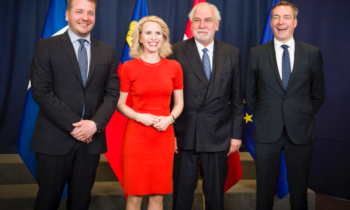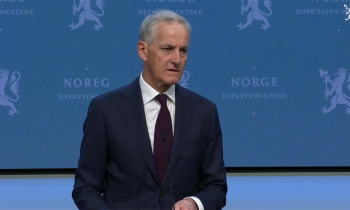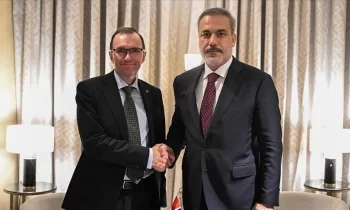 Iceland, Lichtenstein, and Norway want to be part of the EU’s transitional deal with the UK after the latter leaves the bloc in April 2019.
Iceland, Lichtenstein, and Norway want to be part of the EU’s transitional deal with the UK after the latter leaves the bloc in April 2019.
“We need to find solutions for our states so we don’t fly off a cliff,” Lichtenstein’s foreign minister Aurelia Frick said on Tuesday (16 May), ahead of a meeting with the EU’s Brexit negotiator, Michel Barnier, and Maltese deputy prime minister Louis Grech, whose country holds the EU presidency.
“When the EU is negotiating the divorce from the UK, it automatically means the divorce from the EEA-EFTA countries,” she said, referring to the European Economic Area (EEA), to which Lichtenstein, Norway and Iceland belong, along with all EU member states.
Together with Switzerland, the EEA trio forms the European free trade area (EFTA), but Swiss people rejected being part of the EEA and have bilateral relations with the EU instead.
The EEA council meets with the EU twice a year and provides political impetus to the relationship.
Frick said that the three countries were “not first thing on the EU’s mind when dealing with Brexit”, but she insisted that they were “in the same boat” as the EU on border protection, police cooperation and asylum policy.
“We are not ordinary third countries, but the EU’s closest partners and friends,” she said.
She added it was necessary to clarify how the rights of persons and companies acquired through the EEA treaty could be maintained after Brexit.
The UK has not yet triggered a clause in the EEA treaty, notifying the EU that it intends to leave the EEA.
If it neglects this formal obligation, the clause will likely be triggered by the EU, said Dag Werno Hotler, deputy secretary general of EFTA.
“The agreement is only available to EU and EFTA members,” he said.
Frick and her Norwegian colleague, EU minister Frank Bakke Jensen, said they were “open-minded” about the UK re-joining EFTA, an organisation it helped to found in the 1960s.
“But the initiative would have to come from the UK. For the moment, the question is not on the table,” the ministers said.
Bakke-Jensen said that the EEA cooperation worked well.
“The EEA agreement has proven it is viable, useful, possible to adapt to an ever changing landscape and still relevant for us,” he said.
“Our relationship with the EU is a dynamic relationship. When EU changes its laws and agreement we do the same. We are working on this every day,” he said.
Frick also said the institutions worked smoothly, and the problem was that few people knew about it.
“As a minister, I try to raise awareness about the EEA and the fact that it’s actually functioning very well. In a time of populism and globalisation critics, we should be very happy that we have unexciting integration politics”, she said.
(euobserver)



